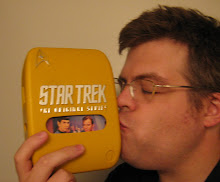

A tenderhearted pair of my co-workers rescued an abandoned young rabbit on the street today, which may be why Thumper's advice is ringing in my ears as I try to make this review: "If you can't say nothin' nice...don't say nothin' at all."
Sorry, rabbit. The sixties are underway and 1961's Hugo Winner by Walter M. Miller Jr. was not and never will be a favorite book of mine.
It concerns three events, each 600 years further into a very unfortunate possible future of war, atomic mutation, mass illiteracy, tribal conflict and suchlike. The events feature monks of the order of St. Leibowitz, copying, illuminating, embellishing, and preserving the personal effects, blueprints, relics, and grocery lists of the long-dead soldier Isaac Edward Leibowitz, debating their canonical value, reinventing the tech implied within, and eventually expanding the order's mandate to the preservation of all knowledge against human forces bent on self-eradication.
Today I bumped it up from the petulant 'no stars' I had written in my notes at the time, to one star out of four, still my most negative opinion of a Hugo so far. Yes, sadly, there's worse to come and I needed the 'no stars' rating for some others down the line.
'A C for L' is a classic. It is beloved. By other people. I admit this freely: You won't win me over by making me read Latin. Or by, seemingly, having a very low opinion of humanity.
What's worse is 'A Canticle for Leibowitz' seems like it might have inspired a sequence in my favorite episode of Babylon 5's fourth season ''The Deconstruction of Falling Stars". J. Michael Straczynski noticed that similarity halfway through writing it, I guess, thought about taking the bit with the undercover monk out or changing it, and left it in anyway. I'm glad he did. It was awesome and, unfortunately, said everything 'Canticle's' first two thirds said, only MUCH faster and less pretentiously.
I admire scholars. I do. My dearest friend is a librarian who probably fantasizes about working tirelessly in a post-nuke ivory tower, preserving the lone light of knowledge for the day the grubby masses will appreciate it once again. Probably. More likely his fantasies would make juicier reading than 'Canticle'. Maybe they'd have some romance and/or some zombie hordes.
I may have this unfounded hate on for classics of literature, which I know makes my reviews VERY suspect, but I'm damn thankful for people who write stuff down and work to preserve literacy. So, the scholar types in 'Canticle' who give their lives for over a thousand years are admirable, even if I didn't really like any of them. (Probably they were just too church-y for me.)
And, of course, unlike in Babylon 5, the overwhelmingly stupid bulk of the human race (or 'Simpletons', as many of them proudly call themselves after 'The Flame Deluge') never gets any better or smarter, finally using the technical knowledge the monks preserved to continue bombing each other to bits, alongside a REALLY AMAZINGLY DEPRESSING treatise on assisted suicide for a mutant woman with two heads.
Author Miller apparently did himself in just before the sequel came out in 1997. I don't plan to read it. It's probably a classic, too.
Old Misery-Guts Miller was one hundred percent a smarty pants. He deserved his Hugo. Especially in the 1960's. Anti-nuke fiction was a good idea. Still is. I'm all for not being nuked. So we should probably KEEP NOT NUKING EACH OTHER.
But until the human race stops doing kind-hearted things on the sly, like when I saw Kim and Rhianna caring for a lost rabbit this morning, I'm not going to give up on our species.

No comments:
Post a Comment